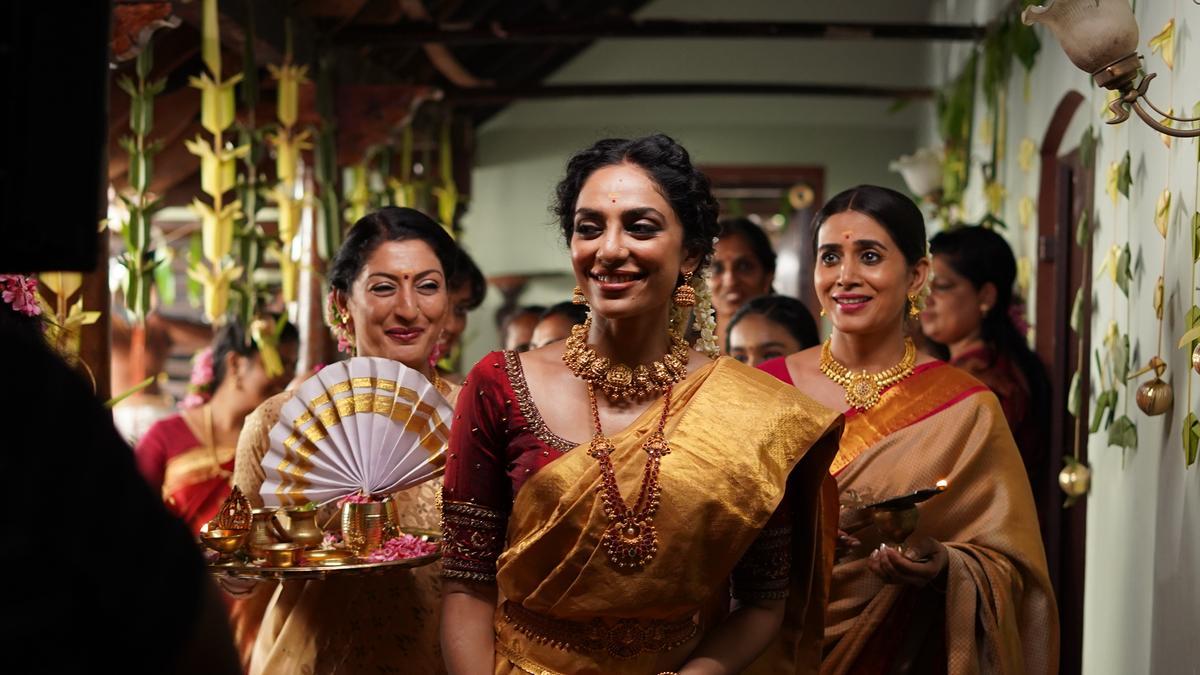
“Love, Sitara” embarks on its journey with an evocative nod to Leo Tolstoy’s timeless classic, Anna Karenina. “All happy families are alike; each unhappy family is unhappy in its own way,” proclaims Sitara, also known as Tara (Sobhita Dhulipala). This line, borrowed from Tolstoy, sets a high literary benchmark which Vandana Kataria’s film strives to meet through its dialogue, crafted by Abbas and Hussain Dalal. Although the film’s lines, such as “Happiness lies in honesty” and “Dysfunction means they are making an effort,” attempt poignant reflections, they don’t quite achieve Tolstoy’s profound resonance.
The film centers on the complex relationship between Tara, a renowned interior designer, and Arjun (Rajeev Siddhartha), a chef with a promising career in Singapore. Their turbulent romance takes an unexpected turn when Tara discovers she is pregnant. Opting not to disclose her pregnancy to Arjun immediately, Tara proposes marriage, leading to both families gathering in the picturesque setting of Kerala at her maternal grandmother’s house. As plans unfold over quirky family dynamics and light-hearted banter, the comedy elements are brief, giving way to more profound narrative explorations.
From the onset, a skeptical friend questions Tara’s sudden enthusiasm for marriage, hinting at Tara’s previous reluctance to tie the knot despite Arjun’s earlier proposals. The plot thickens as Tara navigates through a web of deceptions and personal quandaries, including potential cracks in her parents’ relationship. Sobhita Dhulipala captures this emotional turmoil adeptly, reminiscent of her portrayal of another wedding planner, Tara Khanna, in the Amazon Prime series “Made in Heaven.”
Vandana Kataria, who also serves as an acclaimed production designer, made her directorial mark with her debut film “Noblemen” (2019). This film was a gritty examination of bullying and toxic masculinity set in a boarding school. “Love, Sitara,” however, shifts its lens to the female experience, featuring a screenplay by Sonia Bahl. Sonali Kulkarni delivers a solid performance in her pivotal role, while veteran theatre actor B. Jayashree introduces a delightful touch as Tara’s eccentric grandmother. Despite these strong performances, “Love, Sitara” seems to lack the psychological depth and emotional intensity found in Kataria’s earlier work.
One notable aspect that slightly hampers the film’s authenticity is its treatment of dialogue, which vacillates between English and Hindi, with occasional sprinkles of Malayalam.
. This multilingual approach sometimes makes the family interactions feel overly scripted rather than spontaneously genuine. Lines such as “A mistake can wreck a thousand lives” and “hearts, like monuments, should be built of stone” come off as overly orchestrated. Furthermore, a climactic confrontation veers into melodramatic territory, complete with dramatic weather elements more suited to a television soap opera.
The film’s Kerala backdrop, while visually pleasing, isn’t utilized to its full potential. Instead of deeply integrating the locale into the storyline, certain character portrayals edge on stereotypes, such as the chatty housemaid with a drunkard spouse. These elements, while adding some local color, detract from the narrative’s overall authenticity.
However, the film redeems itself in its penultimate scene where Tara and Arjun engage in an argument that believably encapsulates the wear and tear of a long-term relationship. This scene particularly stands out, offering a glimpse of what could have been a more consistently authentic portrayal of their dynamics. The presence of Tara Khanna from “Made in Heaven” in the viewer’s mind is understandable but does slightly overshadow Dhulipala’s performance in this film.
Among the supporting cast, Ikhlaque Khan’s portrayal of Arjun’s father, a retired army man fixated on duty and patriotism, stands out. His character adds a layer of traditional values and rigidity to the family mosaic, enriching the story. However, the standout character for many viewers may very well be Tara’s best friend, Anjali (Tamara D’Souza). An award-winning photojournalist specializing in human rights issues, Anjali brings a different perspective grounded in reality. Her decision to document the pre-wedding festivities with her camera offers a tantalizing ‘meta’ commentary on the nature of observation and participation.
In conclusion, “Love, Sitara” is a film fraught with intriguing conflicts and characterized by Sobhita Dhulipala’s compelling performance. Yet, it grapples with uneven writing and underutilized settings. Currently streaming on ZEE5, the film invites viewers to explore its portrayal of modern relationships, layered with familial expectations and personal aspirations.












